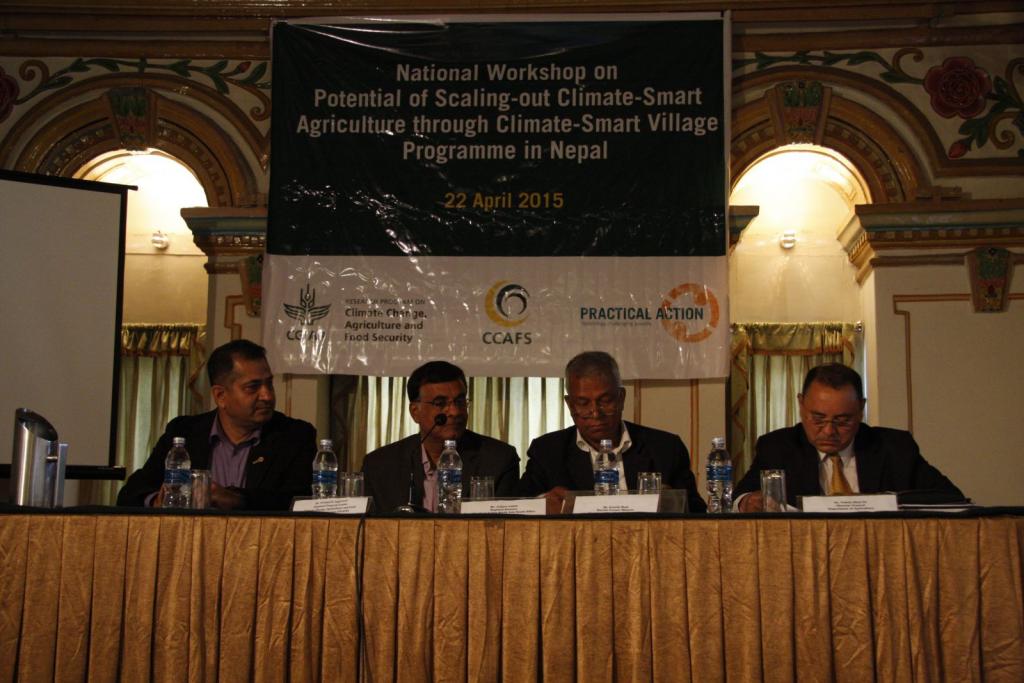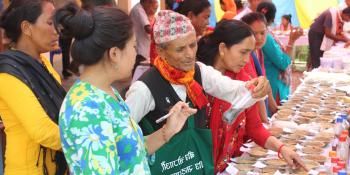Workshop calls for integrating climate-smart village model into government schemes in Nepal

Stakeholders met in Kathmandu to discuss how climate-smart agriculture could be scaled-out through the climate-smart village model.
Practical Action Consulting (PAC) along with the CGIAR Research Program on Climate Change, Agriculture and Food Security (CCAFS) South Asia conducted a workshop to share findings from a recently conducted feasibility study on “Implementing Climate Smart Villages in Nepal” on 22 April in Kathmandu. The workshop aimed to build a common understanding on the relevance of climate-smart village programme in Nepal and to disseminate findings and recommendations to key stakeholders to outline an enabling environment for scaling out climate-smart villages, including the supporting policies, strategies, knowledge networks, investments and institutional mechanisms.
Nearly 60 participants from the government, civil society groups, private firms, multilateral and bilateral development organisations, were present. Some of the institutions represented were: the Department of Agriculture, Nepal Agricultural Research Council (NARC), International Centre for Integrated Mountain Development (ICIMOD), World Bank, International Finance Corporation (IFC), Federation of Nepalese Chambers of Commerce and Industry (FNCCI), Local Initiatives for Biodiversity, Research and Development (LI-BIRD), Japan International Cooperation Agency (JICA), the Center for Environmental and Agricultural Policy Research, Extension and Development (CEAPRED), the Forum for Rural Welfare and Agricultural Reform for Development (FORWARD Nepal), Nepal Development Research Center (NDRI), the International Food Policy Research Institute (IFPRI), the International Maize and Wheat Improvement Center (CIMMYT) and Mercy Corps, amongst others.
SPEAKERS AT THE WORKSHOP ON SCALING OUT CLIMATE-SMART VILLAGES IN KATHMANDU. PHOTO: PAC, NEPAL
The workshop was inaugurated by the Chief guest, former Minister, Mr. Ganesh Shah, from the Ministry of Science, Technology and Environment. Other guests included Yubak Dhoj GC, Director General of Department of Agriculture and P.K Aggarwal, South Asia Regional Program Leader of CCAFS.
Linking climate-smart agriculture to current schemes
The inaugural session stressed the need for climate-adaptive strategies to protect farmers from the perils of climate change and climate variability in Nepal. Yubak Dhoj GC highlighted the importance of climate-smart agriculture and its links with the department’s current agricultural extension programs. He showed keen interest in the climate-smart village model and indicated it had potential for implementation through the department’s ongoing programs.
The technical session kicked off with Kanchan Raj Pandey, Senior Agriculture Economist, Department of Agriculture, facilitating a discussion on the technical aspects of scaling out climate-smart villages.
P.K. Aggarwal presented the concept of climate-smart agriculture and climate-smart villages and how it can benefit farmers. ML Jat, from CIMMYT, presented the evidence in scaling out the concept of climate-smart agricultural interventions through climate-smart villages. He cited examples and success stories from India which have helped farmers reduce their cost of production and improve yields through adaptation of different climate-smart agriculture practices.
PK Joshi, South Asia Head of IFPRI, highlighted the importance of policies and institutions for scaling out climate-smart agriculture and how it can be linked with the agenda of food security. Laxmi Dutta Bhatta shared ICIMOD’s experience in implementing climate-smart villages and how they incorporated the concept to suit mountainous landscapes.
Findings of feasibility report
Milan Kumar Joshi from PAC along with Arun KC from CCAFS, presented the findings of the feasibility study report of climate-smart villages in Nepal. They shared their selection process for the districts where the climate-smart village concept can be implemented on the basis of vulnerability assessments, adaptive capacity and food security. In their presentation, they highlighted the potential climate-smart interventions in the selected villages, institutional mechanisms and sources of investment to develop the climate-smart villages in the selected areas.
Recommendations
They recommended that the climate-smart villages need to be established in Nepal with support from the local government (Village and District Development Committee) including farmers groups, private sector and non-governmental organizations. Further, they added that schemes and guidelines need to be developed for scaling out climate-smart villages through inter-departmental collaboration linking with National Adaptation Programmes of Action (NAPA), Local Adaptation Plans of Action (LAPAs) and ADS.
A lively discussion ensued on the cost aspects of climate-smart agriculture and the financial capacity of smallholder farmers to adapt to these practices. Also discussed was how the Government of Nepal could incorporate climate-smart villages into governance schemes.
Rakshya Shah is an intern at Practical Action Consulting, Nepal




